|
 Hamish Brown still spends much of his time in the hills and is well known as author and photographer. Hamish Brown still spends much of his time in the hills and is well known as author and photographer.
He was creator of the May TGO Challenge event - trekking coast-to-coast across Scotland, the sort of thing Braehead did so well.
He also spends at least three months every year in the Atlas Mountains of Morocco, taking treks, climbs, bird-watching groups and Land Rover tours into the exotic wilderness to which any Braeheader's would be very welcome.

Picture of Hamish with Braehead pupils.
Back L/R: Chic Arnott, John Colston, Hamish Brown, Linda Jordon, ?
Front L/R: Tom Izatt, Bill Simpson, Ian Moreland, Eric Rollo, David (Nabby) McNab
Hamish Brown
Photo Gallery - 01 (colour photo's)
Photo Gallery - 02 (colour photo's)
Photo Gallery - 03 (black & white photo's)
Photo Gallery - 04 (black & white photo's)
|
T h e L a s t H u n d r e d
|
|
 "Having completed several rounds of Munro's - in summer and winter, alone, with his dogs or school parties - Hamish Brown has an unrivaled knowledge of the Scottish hills. "Having completed several rounds of Munro's - in summer and winter, alone, with his dogs or school parties - Hamish Brown has an unrivaled knowledge of the Scottish hills.
In this collection of lively reminiscences, he shares some of his experiences, including a Christmas in Torridon, Easter on Mull and Midsummer day on A'Mhaignean above Loch Maree. Also included is the story of the Ben Nevis weather station and an essay on the menace of the midge, among many others.
The Last Hundred is more than a book about Munro bagging: It is an amusing and sometimes provocative collection by a man who climbs Munro's for the only valid reason - for fun.
This is a very easy book to read. Hamish has written a chapter dedicated to Braehead School. Here will be found some of his memories and experiences at Braehead school as he takes us on a journey with the pupils. Lookout for the chapter on Storm! (keep your tissues handy!)
In the 'Last Hundred' there are many examples of breathtaking photographs taken by Hamish.
A selection of photographs showing pupils from Braehead, can be seen below.
|
Contents:
Introduction
MUNROITIS
An Incurable Disease
The Game of Listing Hills
Camp by the Buachaille
MANY A MUNRO
Christmas Peaks
(Beinn a' Ghlo)
Music
The Huge Concept of
Beinn Dorian
Under Ben Alder
A Hundred Years Ago
Squelching Across Scotland
Lessons from Experience
Crossing the Moor
BRAEHEAD, THE STORY OF A SCHOOL
Snowed-in at Glendoll
A Remembered Traverse of
the Cuillin Ridge
The Wanting
AND MORE MUNROS
All About Attow
Glen Pean Cottage
Mull: Easter on the Heights
In Search of a Maiden
Wyvis - Hill of Terror
Beginnings
STORM -
THE STORY OF A DOG
Storm's Last Munro
ONE GAME, MANY APPROACHES
The Ben Nevis Observatory
The Hariot
The First Munro on Skis
Last Run:
Coire na Ciste
The World of the Red Deer
In the Rut
The enace of Midges
LASTLY
Over the Top
Protected Out of Our Own
Scotland - the Rot
Pity Poor Foinaven
Closing the Book
Schiehallion! Schiehallion!
Schiehallion!
|
|
|
Pancake night in the Blackwood Bothy,
November 1967
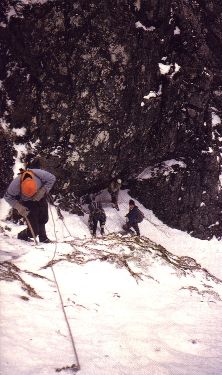
An ascent of Bidean by the NW Gully of Stob Coire nam Beith. Braehead pupil leading up Barclay Fraser
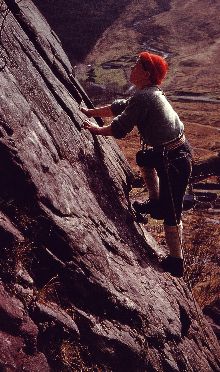
A Braehead lad climbing on Sheepflank Wall,
Polldubh, Glen Nevis (early 1960's
|
|
|
Introduction:
I am not a Munro-bagger. I keep having to say this. Admittedly I've climbed many Munros, possibly for too many, but this was fortuitous, a lucky chance if you like, and Munros never were, and most certainly aren't, the be all and end all of my hill interests. It is a strange British trait to take pastimes so very seriously (and treat serious issues as a big joke) and I wince when encountering youths who declare themselves fervent Munroists and then give their 'tally' of, say 12 Munros. Come hell or high water (and the Scottish hills are good at combining the two) they are out every weekend, every holiday, just to gain another tick on the list. Thank God for Muriel then and her mockery and mickey-taking. The message is still there. Extremists, fundamentalists, are dangerous. Munros are fun.
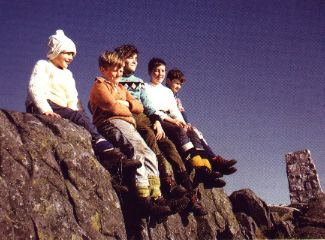 The title of this book may be taking the mickey out of The First Fifty but it agrees with the joys and pleasures garnered. I'm no Oor Wullie look alike in puking colours and the Gray and the Brown would probably agree to differ on a whole range of topics. We'd enjoy arguing though (something of a national trait) but, name any Munro, and we could talk the hours away together. The Munros are a great, shared blessing. Our books are basically Munro gossip. As this could just be my last such, the title is perhaps apposite (I'm not quitting Munros, I want to write more on other topics, that's all), and I'll take the chance to let off steam on various matters. Far too often now Munro-bagging is Munro-bagging. How and why it is done I think is important. There is an arrogance of approach today, which I find deeply disturbing. Instant-Munroing is as unsavioury (and indigestible) as instant food. The hills must be loved, for themselves, and not just for quick self-gratification. In other spheres that is defined as rape. The title of this book may be taking the mickey out of The First Fifty but it agrees with the joys and pleasures garnered. I'm no Oor Wullie look alike in puking colours and the Gray and the Brown would probably agree to differ on a whole range of topics. We'd enjoy arguing though (something of a national trait) but, name any Munro, and we could talk the hours away together. The Munros are a great, shared blessing. Our books are basically Munro gossip. As this could just be my last such, the title is perhaps apposite (I'm not quitting Munros, I want to write more on other topics, that's all), and I'll take the chance to let off steam on various matters. Far too often now Munro-bagging is Munro-bagging. How and why it is done I think is important. There is an arrogance of approach today, which I find deeply disturbing. Instant-Munroing is as unsavioury (and indigestible) as instant food. The hills must be loved, for themselves, and not just for quick self-gratification. In other spheres that is defined as rape.
My most active Munro years were the dozen I spent taking Fife youngsters into the wilds. As far as I know, mine was the first appointment in the state school to do what has become outdoor education and we roamed Scotland to the extent that, eventually, pupils from Braehead School had climbed every Munro.
Munro-bagging was a lively part of their world. What has happened in the last decade to outdoor education (like any other education) is a sorry story but then I believe we largely get what we deserve form our elected representatives.
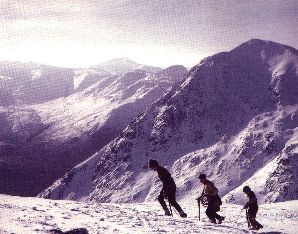
In those years, taking beardless school parties away constantly led to the repetitive problem of shaving off my stubble every time I returned so, in self-defence, I simply grew a beard, which has remained, thereby gaining several more days in life for more pleasurable activities (I've aye grudged the hours spent on servicing this poor human machine).
One of my great delights has been the companionship of two dogs, the Shetland collies, Kitchy and Storm. The first I inherited when my father died and he, after a traumatic start, became the hill mascot of the Braehead kids. Storm chose me but, like Kitchy, did all the Munros so they have their part in my backward look over the mountains. I am un-apologetic about telling so much about Storm. He was the best companion with whom I did most Munros: always enthusiastic, uncomplaining, tireless, good-tempered. I wish all my friends were like him. I wish I was!
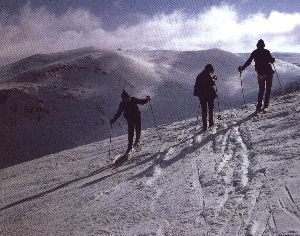 This may appear a bit of a rag-bag of a book, full of started topical hares, comment, judgments, some repetitions, sometimes loquacious, sometimes spartan, whiles cheery, whiles dour. But that is how it is. It is because life is so dull otherwise, and for so many, that such numbers are now breaking out and heading for the hills. I did it myself, as I tell in that first-ever book about the Munros, Hamish's Mountain Walk, and I've kept right on doing it. A systematic Munro coverage would be both boring and impractical. Some hill days are more memorable than others, just as some hills are finer than others (who'd swap any Geal Charn - or all of them - for one An Teallach?), and so this book has to be inconsistent and selective. I'm often enough accused of shit-stirring but, with hindsight, I've often been right in so doing. Blowing the whistle. This may be my last opportunity to do so. My despair at Britain, at Scotland, is too deep now. I want sunnier, unspoiled mountains and warmer, hopeful peoples. This may appear a bit of a rag-bag of a book, full of started topical hares, comment, judgments, some repetitions, sometimes loquacious, sometimes spartan, whiles cheery, whiles dour. But that is how it is. It is because life is so dull otherwise, and for so many, that such numbers are now breaking out and heading for the hills. I did it myself, as I tell in that first-ever book about the Munros, Hamish's Mountain Walk, and I've kept right on doing it. A systematic Munro coverage would be both boring and impractical. Some hill days are more memorable than others, just as some hills are finer than others (who'd swap any Geal Charn - or all of them - for one An Teallach?), and so this book has to be inconsistent and selective. I'm often enough accused of shit-stirring but, with hindsight, I've often been right in so doing. Blowing the whistle. This may be my last opportunity to do so. My despair at Britain, at Scotland, is too deep now. I want sunnier, unspoiled mountains and warmer, hopeful peoples.
I am the complete pessimist at heart which means I'm constantly 'surprised by joy' (the optimist, perforce, is constantly being disappointed), and plenty of the best days of my life have ambushed me on the Munros - so I write about Munros. The last Hundered? I doubt it.
Misunderstandings could arise from glancing at any part of this book so please reserve judgement till the end. When wrong sticks are picked up they can still give painful beatings. Reminds me of the story of the shepherd and his girlfriend who were watching the spectacle of the tups (rams) being put to the ewes. Eventually he leered at the girl, 'I could be doing that myself', to which he received the deserved reply 'Ah well, dear, that's no problem. There's plenty of ewes in the next field too.'
I've included odd poems which have Munro connections. Some of these have appeared elsewhere but, despite public interest, editors are loathe to use such - or hill fiction - and most article contributions seldom quote or produce much in the way of novelty. The late twentieth Century faces a new illiteracy alas and cannot digest anything longer than a television 'bite'.
As a practical help the pieces describing specific Munros or groups have the Ordinance Survey Landranger map sheet number given after the titles (coded as OSLR 20 for instance). People often find reading such descriptions with the relevant maps available makes for greater clarity.
Many of the pieces used here first appeared, in some form, in magazines or newspapers and their re-creation is gratefully acknowledged. I apologise for odd repetitions that unavoidable crop up as a result of such recycling - but their reuse may have saved one tree from being pulped! My thanks to the following (some of which have also been recycled): The alpine Journal, The Angry Corrie, Canoe Camper, The Challenger, Climber and Hillwalker, Country Life, The Courier, Footloose, The Herald, The Great Outdoors, The Lady, The Scots Magazine, The Scotsman, Scottish Field, A Scottish Childhood, Scottish Mountaineering Club Journal, Skier, and Sunday Standard.
Hamish Brown
Kinghorn, 1994
|
Many thanks to Hamish Brown who has given
permission to use images from his book (above)
'The Last Hundred'
|
|
|
|

